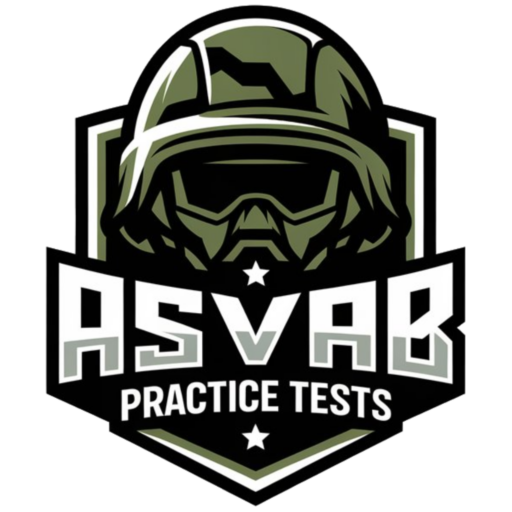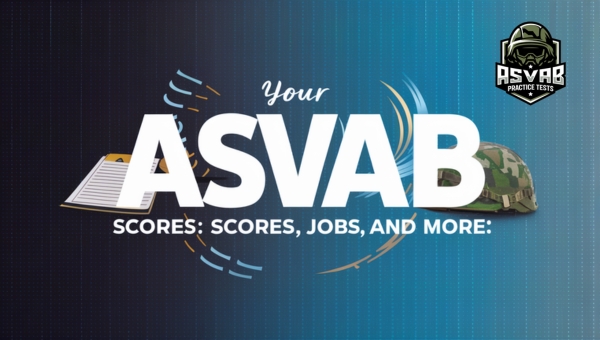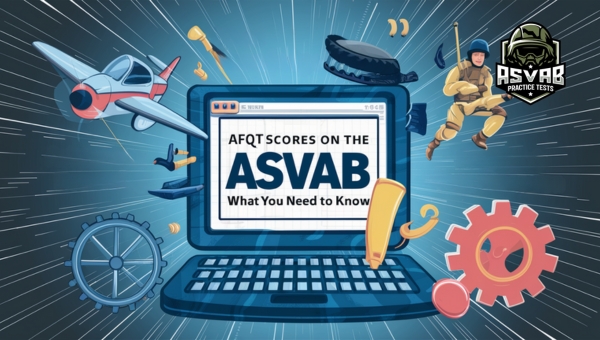ASVAB Calculator Use: The Shocking Truth You Need to Know
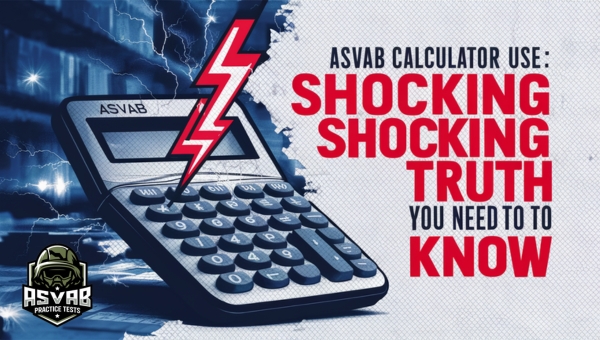
It can be a little intimidating to navigate the ASVAB, particularly if you don’t know what resources are accessible to you. Imagine yourself preparing for the exam when all of a sudden you think, “Can I use a calculator on the ASVAB?”
In this article, we’ll delve into the specifics of the ASVAB’s calculator policy, how it impacts you, and how to effectively prepare without one. We’ll also clear up some common myths and misconceptions. If you’re eager to ace the ASVAB, we’ve got you covered with all the essential details. Let’s dive in!
Policy Of ASVAB Calculator
When preparing for the ASVAB, one common question arises: Can you use a calculator on the ASVAB? Understanding the calculator policy is crucial as it can impact how you approach your study and test-taking strategies. Let’s delve into the specifics of this policy and how it affects test-takers.
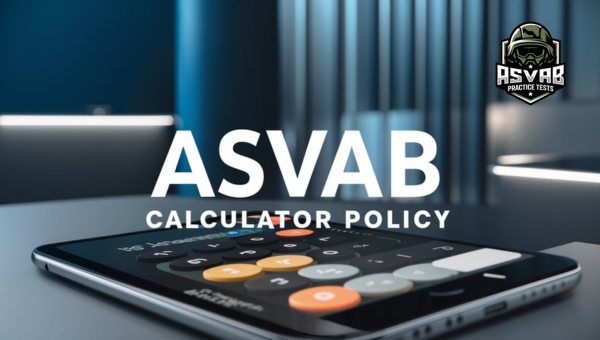
Are Calculators Allowed?
To answer the question directly, calculators are not allowed during the ASVAB test. The test administrators have established this rule for several reasons, including:
- Ensuring a level playing field for all test-takers.
- Evaluating the fundamental math skills of each candidate without the aid of electronic devices.
- Preventing any potential technical issues that could arise from using calculators.
This policy underscores the importance of being proficient in basic arithmetic and problem-solving skills.
How Does This Affect Test-Takers?
The prohibition of calculators on the ASVAB has several implications for those taking the test, particularly in sections like Arithmetic Reasoning and Mathematics Knowledge:
- Increased Focus on Mental Math: Test-takers need to be adept at performing calculations in their heads or using basic paper-and-pencil methods.
- Practice with Basic Tools: It becomes essential to practice solving problems without relying on a calculator.
- Time Management: Without a calculator, managing time efficiently during the test is even more critical.
- Enhanced Problem-Solving Skills: This rule encourages the development of stronger problem-solving abilities, which are valuable in both military and everyday contexts.
Understanding these implications can help you better prepare for the test and improve your performance.
Also Read: Army MOS Codes | Your Essential Guide to Military Jobs
How to Prepare Without a Calculator?
Preparing for the ASVAB without a calculator might seem challenging, but with the right strategies, it’s entirely manageable. Here’s a structured approach to help you get ready:
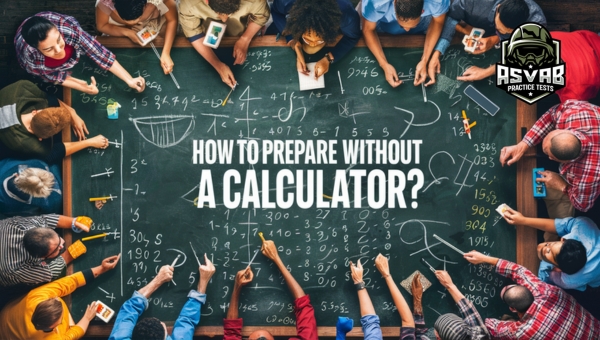
a.) Understand the Basics
- Review Fundamental Math Concepts:
- Focus on arithmetic, algebra, and geometry.
- Ensure you understand basic operations like addition, subtraction, multiplication, and division.
- Practice Mental Math:
- Regularly practice solving problems in your head.
- Use flashcards to drill basic math facts and improve speed.
b.) Utilize Resources
- Study Guides and Workbooks:
- Invest in ASVAB-specific study guides that cover math sections.
- Use workbooks that offer practice problems and step-by-step solutions.
- Online Resources:
- Access free online tutorials and videos to reinforce learning.
- Take advantage of practice tests available on various educational websites.
c.) Develop Problem-Solving Strategies
- Break Down Problems:
- Learn to deconstruct complex problems into smaller, manageable steps.
- Practice this technique with various types of math questions.
- Use Estimation:
- Develop skills to estimate answers quickly.
- This helps in verifying the plausibility of your solutions.
d.) Time Management
- Timed Practice Tests:
- Simulate test conditions by taking timed practice exams.
- This helps in managing time effectively during the actual test.
- Prioritize Questions:
- Learn to identify and solve easier questions first.
- Leave more challenging problems for later if time permits.
e.) Seek Help When Needed
- Tutoring:
- Consider hiring a tutor for personalized guidance.
- Group study sessions can also be beneficial.
- Ask Questions:
- Don’t hesitate to ask teachers or peers for clarification on difficult concepts.
- Join online forums and communities for additional support.
f.) Stay Consistent
- Daily Practice:
- Dedicate a specific time each day for math practice.
- Consistency is key to retaining and understanding concepts.
- Track Progress:
- Keep a log of your practice sessions and scores from practice tests.
- Regularly review this log to identify areas needing improvement.
By following these strategies, you can effectively prepare for the ASVAB without a calculator. Remember, the goal is to build strong foundational skills and develop confidence in solving math problems manually.
Also Read: Is the ASVAB Hard? Tips & Insights
Common Misconceptions
When it comes to the ASVAB, there are a lot of misunderstandings about what is and isn’t allowed. One of the most common questions is about the use of calculators during the test. Let’s dive into these misconceptions and clear up any confusion.
Calculator Myths
A prevalent myth is that calculators are permitted during the ASVAB. This belief can lead to some test-takers being unprepared.
Here are the key points to remember:
- Calculators are not allowed: Regardless of the section, using a calculator during the ASVAB is strictly prohibited.
- Reasoning behind the rule: The test is designed to assess basic arithmetic and mathematical reasoning skills without any aid.
- Preparation is key: Knowing this rule helps you focus on practicing mental math and problem-solving techniques.
Why Some Test Centers Allow Calculators for Other Tests?
The confusion often arises because other standardized tests do permit calculators. Here’s why this happens:
- Different rules for different tests: Tests like the SAT or ACT allow calculators, which can create a false assumption that the ASVAB follows the same rules.
- Test-specific policies: Each standardized test has its own set of rules tailored to its objectives. The ASVAB aims to evaluate your innate problem-solving abilities without external aids.
- Misleading experiences: Test centers that administer multiple types of exams might not always clearly distinguish the rules between them, leading to misunderstandings.
Understanding these nuances will help you better prepare for the ASVAB and avoid any last-minute surprises.
Conclusion
Calculators are not allowed during the ASVAB, making it essential for test-takers to prepare accordingly. Understanding the rules and practicing without a calculator can significantly improve your performance on the exam. Focus on honing your arithmetic and problem-solving skills to navigate the test confidently.
By doing so, you’re setting yourself up for success and ensuring you are well-prepared for the challenges ahead. If you found this information helpful, be sure to check out more of our blogs for additional tips and insights on acing the ASVAB and other standardized tests.
